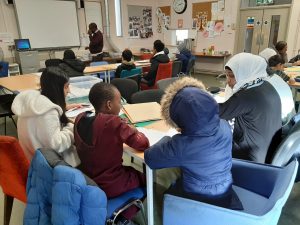What is supplementary education?
Supplementary education is unique compared to mainstream education, as defined by the National Resource Centre for Supplementary Education (NRCSE):
“Supplementary education can be defined as all out-of-school learning. Particularly classes focused on the provision of additional support for curriculum subjects including all languages, history and cultural enrichment activities such as faith, arts and sports.”

Out of school settings tailor learning to the needs of the communities, faith and cultural groups they serve. This can be in the form of adapting the curriculum to include learning mother tongues, cultural history, art, dance and citizenship - alongside traditional subjects in the British curriculum.
What challenges do supplementary schools face?
Students that come from communities disproportionately affected by COVID-19 are also likely to be at risk of having their education being adversely affected. These students may also rely on supplementary schools for educational support as they are community-led and offer more opportunities for one-to-one support.
The main challenge faced by supplementary schools has been to replicate in-person education and social support to be delivered online in a short time frame.
What is remote teaching?
Delivering education virtually has existed for some time now. In mainstream education, schools use a mix of interactive games and videos to engage students and use e-learning portals to set homework. This is done in addition to conventional methods of classroom teaching.
How is RDN supporting students online?
From mid-April, weekly Saturday classes began for Year 9-11 before classes for Year 5-6 and Year 7-8 began soon after. English and Maths support is provided through video calls where students can engage with RDN staff and complete designated work during that time. Staff are able to share their screen with the students to deliver lessons and explain topics that children may find challenging.
Each week is centred on a topic and the emphasis is helping students to also learn in a variety of ways and apply their knowledge in a practical way. This is done through interactive quizzes and games, class discussion, problem-solving activities and critical thinking.
An e-learning environment has also been set up on Google Classroom where students can access past work and ask questions during the week in preparation for the next session. In this way, staff can continue to offer feedback to the student to improve their learning

What is it like teaching online?
My personal experience is that teaching has been exciting, frustrating but also rewarding.
The excitement stems from the fact that each week, the students are eager to learn new things and want to catch up on missed work. Some students have acknowledged that while online learning is different, they also appreciate and quite like the interactive way the lessons are being delivered.
My own frustration comes from the challenges of IT as poor WiFi or issues with video calls on devices can mean it is hard for both teachers and students to access the lesson content.
However, it is also rewarding as we have been using creative ways to overcome these challenges which can be summed up in the following picture.
I asked a family member to take a quick picture of me in the process of a lesson and the circumstance I found myself in:

"I had two students on the call in the Year 5-6 class (student A and student B). Both students were able to see the screen I was sharing however student A could not hear me or speak via the laptop call. On the other hand, student B could communicate with me perfectly.
This meant I had to do a phone call with student A while also being on the video call with student B at the same time to ensure that I could hear each student but also so that they could communicate with me!"
It was an amusing experience but it also highlighted a major challenge that needs to be addressed going forward. The technology gap. It is essential that all students have provision to access catch-up support remotely. The hardware, software or ability to access reliable internet are all important requirements that families will need going forward.
Next steps
The RDN Supplementary School will be continuing support for English and Maths through the summer to aid with the education catch-up plan for school students.
Find out more about our Education programme
